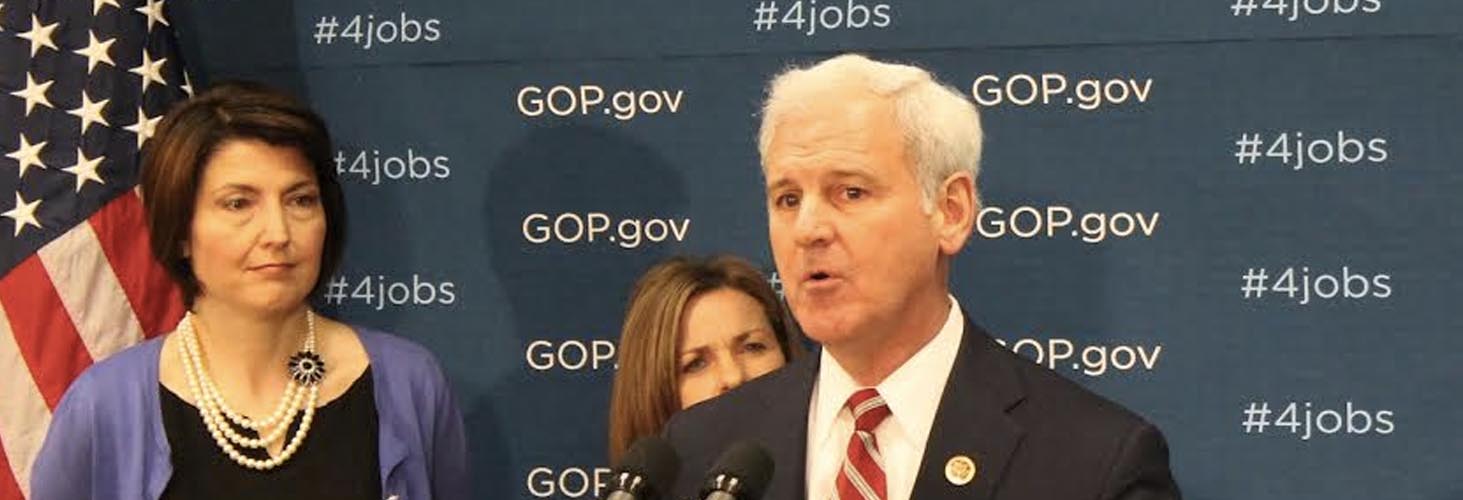By Brandon Moseley
Alabama Political Reporter
Thursday, March 16, 2017, US Congressman Bradley Byrne (R-Montorse) issued a statement in support of President Donald J. Trump’s budget proposal for Fiscal Year 2018.
Congressman Byrne said: “I applaud President Trump and his administration for their commitment to scaling back the Federal government. It is critical that we roll back the Federal bureaucracy and ensure taxpayer money is being used in an efficient and effective manner. I am also pleased to see the President focus on increasing funding for our nation’s military.”
Representative Byrne said, “As with any President’s budget, this is just a proposal to guide Congress as we go through the government funding process. It will ultimately be Congress that makes the decision on where Federal money is spent, and I look forward to working with the President in that process.”
President Trump is requesting a $54 billion increase for defense and a $3 billion increase for the Department of Homeland Security, including an immediate $1.5 billion to build the border wall. The State Department, foreign aid, the Environmental Protection Agency, the Department of Health and Human Services, the National Endowment for the Arts, and the Corporation for Public Broadcasting all would take big cuts in the Trump budget.
The new Office of Management and Budget (OMB) Director Mick Mulvaney briefed reporters, “This is the “America First” budget. In fact, we wrote it using the President’s own words. We went through his speeches, we went through articles that have been written about his policies, we talked to him, and we wanted to know what his policies were, and we turned those policies into numbers. So you have an “America First” candidate, you have an “America First” budget.
Knowing what you know about the President, you could imagine what that budget would look like before you even see it, which is that there will be more money on defense — $54 billion. We could talk about more of that in a second. There’s more money for enforcing security at the border. There’s more money for enforcing laws on the books just generally. Then there’s more money for things like private and public school choice.”
Director Mulvaney added, “Conversely, since the President wanted to do that without adding to the already-projected $488 billion deficit in fiscal year 2018, there were reductions elsewhere to offset dollar for dollar, all of those increases. So we say, plus-up the defense topline number by $54 billion. You will, in other parts of the budget, find a corresponding $54 billion’s worth of reductions. So the President accomplishes his priorities without adding to the deficit. That’s not to say the balance of the budget is balanced next year. It doesn’t. We’ve simply not added to the deficit in order to accomplish these policies. As a result, you’ll see reductions exactly where you would expect it from a President who just ran on an “America First” campaign. You’ll see reductions in the State Department. We’ll talk more about that in a second. You’ll see reductions in the EPA. In fact, you’ll see reductions in many agencies as he tries to shrink the role of government, drive efficiencies, go after waste, duplicative programs, those types of things. If he said it on the campaign, it’s in the budget.”
Director Mulvaney said, “The Defense Department has told us this is the amount of money they need and can spend effectively this year. We’re not throwing money after a problem and claiming that we have fixed it. The Defense Department has given us every assurance they can spend — this full $54 billion — next year in a responsible fashion. And I believe General Mattis when he tells me that. Regarding some of the reductions, you’ll see a fairly dramatic reduction in State Department. That is not a commentary on the President’s policies towards the State Department. That is a comment on the President’s policies towards what’s in their budget. The foreign aid line items in the budget, many of them, just happen to fall within the State Department functions. The President ran saying he would spend less money overseas and more money back home. So when you go to implement that policy, you go to things like foreign aid, and those get reduced. If those had been in the Department of Education, you’d see a more dramatic decrease in education. If they had been in energy, you’d see the decrease there. It just so happens, under the way we spend money in this country, that the foreign aid line items fall within State Department. So I think the number you’re going to see in the State Department is fairly significant. Off the top of my head, it’s 28 percent reduction.”
Director Mulvaney said, “We expect the budget deficit to be roughly the $488 billion for FY2018, as estimated by the CBO. On the EPA, my understanding is that 25 percent cut roughly — 24, 25 — proposed $2 billion, about 3,000 jobs. Scott Pruitt did not quarrel with those figures at a macro level. Part of our ’17 request will include a supplemental request — $30 billion for defense and primarily border. That includes $1.5 billion for the wall this year. There will be money in the FY2018 money for a wall, as well, as you can possibly imagine. This is a hard-power budget. And that was done intentionally. The President very clearly wants to send a message to our allies and our potential adversaries that this is a strong power administration. So you have seen money move from soft-power programs, such as foreign aid, into more hard-power programs. That’s what our allies can expect, that’s what our adversaries can expect, that’s what the President wanted us to relay. And I think we’ve done an effective job of that.”
Congressman Bradley Byrne represents Alabama’s First Congressional District.



















































